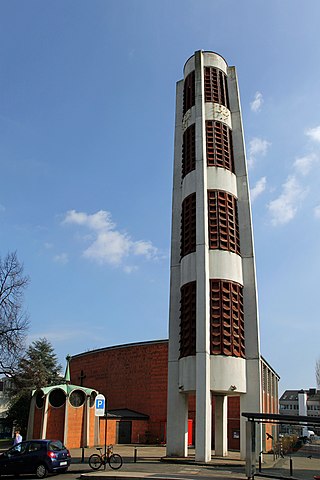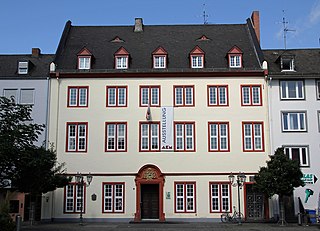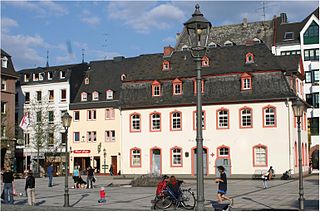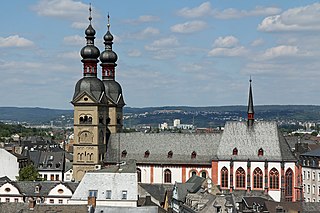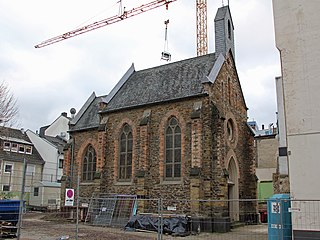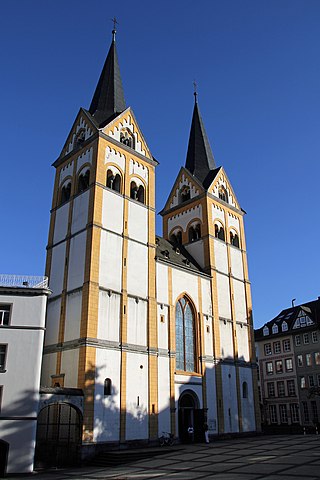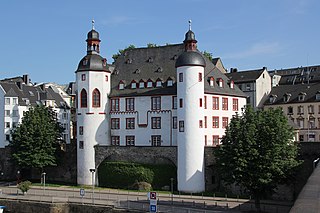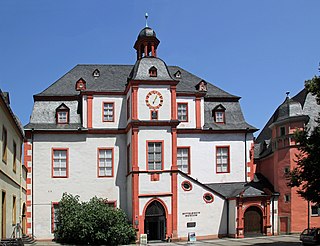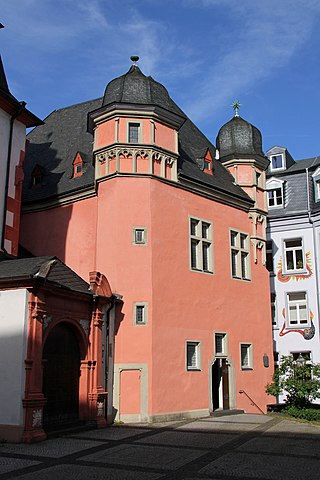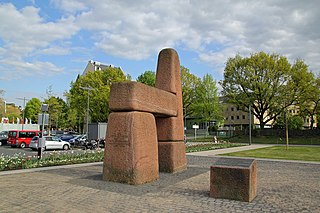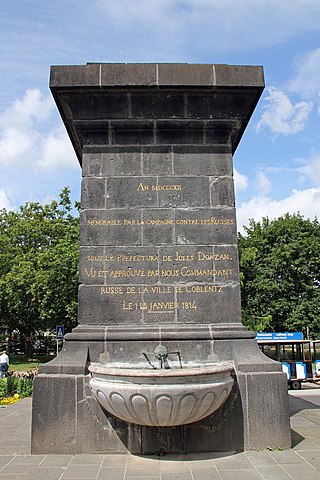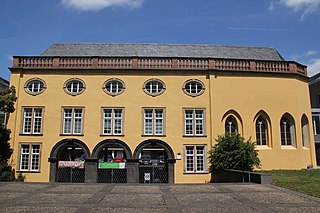Self-guided Sightseeing Tour #4 in Koblenz, Germany
Legend
Tour Facts
3.8 km
71 m
Experience Koblenz in Germany in a whole new way with our free self-guided sightseeing tour. This site not only offers you practical information and insider tips, but also a rich variety of activities and sights you shouldn't miss. Whether you love art and culture, want to explore historical sites or simply want to experience the vibrant atmosphere of a lively city - you'll find everything you need for your personal adventure here.
Activities in KoblenzIndividual Sights in KoblenzSight 1: Sankt Elisabeth
The parish church of St. Elisabeth is a Catholic church in Koblenz, Germany. The church, built in the Rauental district, is one of the most important churches of the 1950s on the Middle Rhine. Since 2012, it has been used mainly as a youth church "X-Ground". It bears the patronage of St. Elisabeth of Thuringia.
Sight 2: Jüdischer Friedhof Koblenz
The Jewish Cemetery in Koblenz is a well-preserved burial site of the Jewish community in northern Rhineland-Palatinate. The Jewish cemetery in the Rauental district, which was first built in 1303, is bordered to the north by today's synagogue of the Jewish community of Koblenz and the surrounding districts, which served as a mourning hall until 1947. In its history, the cemetery has been abolished and destroyed several times, but has always been re-established by the Jewish community in Koblenz.
Sight 3: Haus Metternich
The Haus Metternich, also known as the Metternicher Hof, is a former town courtyard in the old town of Koblenz. The building, built in 1674, was the birthplace of the Austrian statesman Klemens Wenzel Lothar von Metternich.
Sight 4: Alte Münze
The Old Mint is the former mint master's house of the Electoral Mint in Koblenz. Originally, the mint consisted of several buildings, but these were demolished except for the mint master's house. Today, the Münzplatz in Koblenz's old town is located in this area.
Sight 5: Liebfrauenkirche
Get Ticket*The Church of Our Lady is a Catholic church in the center of the old town of Koblenz. Together with the other two Romanesque churches, the former collegiate churches of St. Kastor and St. Florin, it shapes the silhouette of the old town. The beginnings of the church, which is located at the highest point of the old town, date back to the 5th century. From the late Middle Ages to the French Revolution, it was the main parish church of Koblenz. It bears the patronage of Mary, the mother of Jesus, and is a major work of medieval sacred architecture on the Middle Rhine.
Sight 6: Peter-Friedhofen-Kapelle
The Peter-Friedhofen-Kapelle is a chapel of the Order of the Brothers of Mercy of Mary Help of Christians in the old town of Koblenz. This is where the first motherhouse of the order founded by Peter Friedhofen stood.
Sight 7: Florinskirche
Get Ticket*The Florinskirche is a Protestant church in the old town of Koblenz. The church building, which was built around 1100 and dominates the city skyline, belonged to the canons' monastery of St. Florin, which was secularized in 1802. After that, in 1820, it was assigned to the Protestant parish of Koblenz. The early medieval church building is a prime example of Romanesque sacred architecture on the Middle Rhine. The Florinskirche, together with the Bürresheimer Hof, the Altes Kaufhaus and the Schöffenhaus, forms an ensemble of four historic buildings on Florinsmarkt. It is owned in equal parts by the state of Rhineland-Palatinate, in the legal succession of Prussia, and the Protestant parish of Koblenz-Mitte.
Sight 8: Alte Burg
The Old Castle was a former Elector-owned, substantial water castle in the German city of Koblenz, incepted in the 13th century. It is today reduced to the later Burghaus ; which houses the city archives. It sits on tall foundations and has a tall, black slate roof with further floors in the attic and two small cupolas. The lowland castle abutted the remaining building in the old town quarter. The castle house stands tall, next to the Moselle's right-bank towpath downstream of the strategic Baldwin Bridge built in 1342. The bridge, much-repaired, remains intact.
Sight 9: Altes Kaufhaus
The Altes Kaufhaus, also known as the Altes Kauf- und Tanzhaus, is a medieval building in the old town of Koblenz. The building, built between 1419 and 1425 in the late Gothic style, underwent a Baroque reconstruction in 1724 and housed the Middle Rhine Museum from 1965 to 2013. Together with the Bürresheimer Hof, the Schöffenhaus and the Florinskirche, it forms an ensemble of four historic buildings on Florinsmarkt.
Sight 10: Schöffenhaus
The aldermen's house was the seat of the Electoral Court of Trier for the city of Koblenz. Built between 1528 and 1530 in the late Gothic style, the building housed part of the Middle Rhine Museum until 2013. Together with the Bürresheimer Hof, the Altes Kaufhaus and the Florinskirche, it forms an ensemble of four historic buildings on Florinsmarkt.
Sight 11: Peter-Altmeier-Denkmal
The Peter Altmeier Monument in Koblenz is a monument in honor of the former Prime Minister of Rhineland-Palatinate, Peter Altmeier. The monument, which was inaugurated in 1981, is located in the Moselle facilities (Peter-Altmeier-Ufer) not far from the Deutsches Eck.
Sight 12: Deutsches Eck
Get Ticket*Deutsches Eck may refer to:The union of the Rhine and Moselle with a monumental equestrian statue, see Kaiser Wilhelm Monument at the Deutsches Eck (traffic), a corridor between Salzburg and Kufstein
Sight 13: Kastorbrunnen
The Kastorbrunnen in the forecourt of the Basilica of St. Kastor in Koblenz, Rhineland-Palatinate, Germany, is a curious testimony of the Napoleonic Wars. The fountain, built in 1812, was connected to the first aqueduct of the Elector Palatine.
Sight 14: Basilika Sankt Kastor
The Basilica of St. Castor is the oldest church in Koblenz in the German state of Rhineland Palatinate. It is located near Deutsches Eck at the confluence of the Rhine and the Moselle. A fountain called Kastorbrunnen was built in front of the basilica during Napoleon's invasion of Russia in 1812. Pope John Paul II raised St. Castor to a basilica minor on 30 July 1991. This church is worth seeing for the historical events that have occurred in it, its extensive Romanesque construction and its largely traditional furnishings.
Sight 15: St. Jakobus
St. James is a chapel of the Old Catholic parish in Koblenz, Germany. The Gothic church, built in 1355, was originally a cemetery chapel of the Teutonic Order. It is located opposite the Castor Church and is attached to the south wing of the former Leyensche Hof, which today houses the Rhineland-Palatinate State Office for Roads and Transport. The patron saint of the chapel and community is James the Elder. The Koblenz congregation belongs to the Old Catholic Church in Germany.
Share
How likely are you to recommend us?
Disclaimer Please be aware of your surroundings and do not enter private property. We are not liable for any damages that occur during the tours.
GPX-Download For navigation apps and GPS devices you can download the tour as a GPX file.
